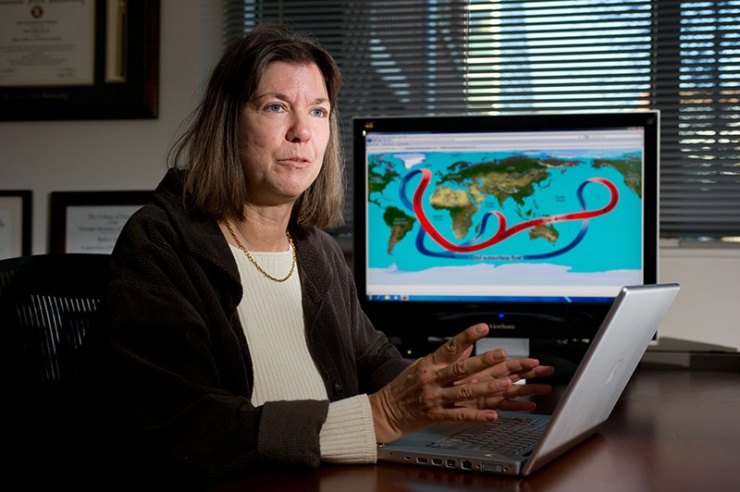
Net nu door de komst van Donald Trump, die zich verzet tegen de klimaathysterie, een verbetering van de positie van klimaatsceptici mag worden verwacht, gooit Judith Curry [zie foto boven] de handdoek in de ring. Zij vindt de situatie in academia zo verziekt en gepolitiseerd dat zij er geen zin meer in heeft. Zijn begon als een trouw volgeling van het VN-klimaatpanel (IPCC). Maar toen zij de feiten ging checken, werd zij klimaatsceptica en probeerde zij bruggen te slaan tussen de opvattingen van protagonisten en antagonisten van de menselijke broeikashypothese (AGW = ‘Anthropogenic Global Warming’). Dat is, naar haar eigen opvatting, kennelijk onvoldoende gelukt. Misschien ziet zij dat verkeerd, of is de situatie de in de VS anders dan bij ons. Want uit ervaring weet ik dat Nederlandse AGWers respect voor haar hebben.
Hiermee stapt zij in de voetsporen van Sally Baliunas, astrofysica en klimaatsceptica die vele jaren geleden ook afscheid nam van haar universiteit, omdat haar het leven daar onmogelijk werd gemaakt. Zij traint thans honden.
Hoe het ook zij, onder de titel, ‘Judith Curry retires, citing ‘craziness’ of climate science’, schreef Scott Waldman voor ‘E&E News’:
Judith Curry, one of climate science’s most vocal critics, is leaving academe because of what she calls the poisonous nature of the scientific discussion around human-caused global warming.
Curry, 63, is retiring from her tenured position as a professor at the School of Earth and Atmospheric Sciences at the Georgia Institute of Technology. She’s instead going to focus on growing her private business, Climate Forecast Applications Network, which provides insights into climate and weather risks for agriculture and energy companies.
The climatologist, who distinguished herself in the field decades ago with research into the Arctic and the causes of the climate feedback that have shaped the region, writes a blog called Climate Etc. It is by turns academic and inflammatory.
There she occasionally mocks what she calls “climate alarmists” who say time is almost out unless humanity weans itself off fossil fuels. In her blog and on Twitter, she has also criticized some of the scientists, including Pennsylvania State University climatologist Michael Mann and Harvard University climate historian Naomi Oreskes, who have become leading voices for climate action. She has testified in front of Congress, boosted by politicians who use her work to argue that environmental regulations and a scaling down of fossil fuel use will be ineffective. Her work is frequently invoked by climate skeptics and denialists. Congressional Democrats, displeased with her conclusions, have investigated the source of her funding.
Curry actually believes, along with the vast majority of climate scientists, that humans are warming the planet, and was even an outspoken advocate of the issue during the George W. Bush years. She was among the first to connect global warming to hurricanes, for example, publishing an influential study in Science in 2006. But where she breaks with the majority opinion is over just how much humans are actually causing global temperatures to rise.
Where many scientists say that humans are the primary cause of warming, Curry believes natural forces play a larger role. She also believes that uncertainty around climate models means we don’t have to act so quickly and that current plans would do little to mitigate warming. She also questions the assertion made by a majority of climate scientists who believe humans have significantly contributed to climate change. In the Obama years, she has become a contrarian of sorts, often criticizing those who rely on climate models to prove that humans are warming the planet at an unprecedented rate.
In announcing her retirement, Curry wrote about what she called her “growing disenchantment with universities, the academic field of climate science and scientists.” She said a deciding factor for leaving the ivory tower was that “I no longer know what to say to students and postdocs regarding how to navigate the CRAZINESS in the field of climate science,” adding that research and funding for it are highly politicized.
In an interview with E&E News, Curry said she would like to see a greater focus on the uncertainties of climate science and a better exploration of them through scientific debate free of politics.
“Once you understand the scientific uncertainties, the present policy path that we’re on doesn’t make a lot of sense,” she said. “We need to open up policy dialogue to a bigger solution space. So I’m just looking to open up the dialogue and to provoke people into thinking.”
Curry, in general, believes that the policies undertaken by the Obama administration won’t do much to reduce global warming levels. That has made her the target of scientists who accuse her of aiding the climate denialists who oppose the environmental regulations of the last eight years and are eager to dismantle them under President-elect Donald Trump. Curry is not convinced that Trump will damage the climate science field, which she said has gone in the wrong direction under Obama.
“Once we get over this little bump of activism, if the Trump administration will put us on a slightly reassuring and saner footing, that will allow all this to die down,” she said. “We can always hope.” …
In the next few years, four to eight or even longer, what do you want to see in the field of climate science; what are you hoping happens? You do believe humans are changing the climate, correct?
Yes, but how much they’re changing the climate, we don’t know. Yes, they do contribute to climate change; very few people would question that. The question is, how much relatively to natural variability? Because we don’t understand natural variability that well, we don’t have a convincing answer for that. Better understanding of natural variability, particularly show our climate connections, but even how volcanoes both above ground and underwater influence the climate, particularly the long-term ocean oscillations and how the chaotic ocean interacts with chaotic atmosphere. That’s reasonably complex, and we don’t understand that.
We need to go back to basics to get the fundamental interactions between the ocean and atmosphere correct, because this, to me, is what’s driving the whole thing. In climate modeling, all the eggs were put in one basket, and we’ve gotten as far as we’re going to get along that particular path. We need to start over with a new path for climate modeling. …
Lees verder hier (verplichte lectuur voor klimatofielen van alle gezindten).
Ondanks haar vertrek bij de universiteit, neem ik aan dat we veel van Judith Curry zullen horen.
Het wijdverbreide obscurantisme in de klimatologie, inclusief het stelselmatig treiteren van integere collega’s, is een smet op het blazoen van de wetenschap.
Voor mijn eerdere bijdragen over klimaat en aanverwante zaken zie hier, hier, hier, hier en hier.






Hans,
Ik ben blij dat je tegen het treiteren van integere wetenschappers bent, ik neem dan ook aan dat je een excuus schrijft aan alle wetenschappers die je ooit zonder goede wetenschappelijke onderbouwing hebt uitgemaakt voor allarnist of erger
Dus ik zie een stroom excuses aankomen voor James Hansen, Michael Mann, Phil Jones etc. Etc.
Verder zie ik uit naar reeks blog gebaseerd op vers gepubliceerde wetenschappelijke literatuur die duidelijk afwijkt van het IPCC standpunt (dus gebaseerd op de literatuur en niet op blogjes)
Dan is dit iets voor u:
https://wattsupwiththat.com/2017/01/05/physical-constraints-on-the-climate-sensitivity/
(helaas toch weer een blogje:-)
Ooeeehhh.. “Alarmist”.. Dat is inderdaad erg treiteren.
Ontkenner oh wat erg
Maar wat vind je van niet onderbouwde beschuldigingen van fraude?
“Treiteren” is ook veel te zacht uitgedrukt. Wat wetenschappers moeten ondergaan als ze een sceptische mening over het klimaat verkondigen is veel ernstiger. Ze verliezen hun baan of ze krijgen geen fondsen voor onderzoek. Daar zullen jouw James Hansen, Michael Mann, Phil Jones etc echt geen last van hebben.
De berokkende schade aan de wetenschap is stijgt met het jaar. Ongefundeerd doemdenken, liegen over waardeloze technologie om een virtueel probleem op te lossen…. en nu gooit het ABP de toekomst van ons nageslacht letterlijk in het water. Dit kost ons minstens 50 jaar ontwikkeling.
Verder nog iets on topic te melden?
Bovenstaande reactie is uiteraard gericht aan Henk.
Hans begint over obscurantisme en het bewust streven maatvoer onwetend houden van mensen
Hans begint over hetvstelselmatig treiteren van collega’s …..
Dat is nu typisch wat de “sceptici” aan het doen zijn en ik ben het met hem eens dat is een smet op de wetenschap en het zou Hans ( en alle andere “sceptici” ) sieren als ze daar afstand van zouden nemen
Dus gewoon weer on topic
Je verwart wetenschap met langetenenlogie
Bij Henk hangt geen spiegel blijkbaar thuis. Zijn continue geschetter tegen alle kritiek / critici/sceptici op de onbetrouwbare / gepolitiseerde IPCC producties is gewoon poep (geen boter dus) op zijn hoofd. Judith Curry is slechts één voorbeeld van een reeks jarenlang betrouwbare kritische opwarmings-/klimaatwetenschappers die in hun werk / “beruf” hun functioneren onmogelijk werd gemaakt. Als de populistische klimaatwetenschap en politiek eenzijdige propaganda vanuit het IPCC de internationale politieke maat blijft voeren en aanhoudend kritiekloos wordt nagekauwd in de zogenaamde “kwaliteits” pers zullen dit soort gebeurtenissen blijven gebeuren. Dit zal dan slachtoffers blijven maken ten koste van de echte kritische klimaatwetenschap. Dat blijft Henk-GreenPeace ver van!
Scheffer ik sta open voor kritiek maar het blijven herhalen van “sceptische ” mantra’s die reeds lang weerlegd zijn is niet het onmogelijk maken van iemands beroep maar gewoon moe worden van het weerleggen van steeds weer hetzelfde en dus totaal zinloos
Ik sta altijd open voor verse kritische wetenschappelijk onderbouwde argumenten
(C-)AGW-sceptici duiden de opvolgende IPCC-producties juist als populistische mantra’s. Het IPCC blijft nog steeds gehouden de (C-)AGW these te bewijzen, terwijl de klimaatfeiten van de laatste 19 jaar in toenemende mate afdoen aan deze populistische ideologische these. IPCC-sceptici vragen al jaren om feietijk bewijs, dat het IPCC maar niet overtuigend kan leveren, maar waar de politiek om politieke drogredenen wel mee aan de haal is gegaan. Het blijft bij het herhalen van de mantra van de 97% consensus en die geldt geheel niet in de popperiaanse wetenschap. Dus Henk, alleen jij zal met bewijs moeten komen, en dat komt maar niet.
Laten we eens ophouden met het reageren op de onzin die henk hier uitkraamt en ons bij het onderwerp houden.
Wat Judith betreft ik denk dat zij deze stap als bevrijdend zal ervaren en zij nu vrijuit kan zeggen/schrijven wat zij denkt.
Zij wordt dan ook succes gewenst met deze nieuwe fase in haar loopbaan.
Ze kon altijd al zeggen wat ze dacht ze heeft een persoonlijk blog waar ze dagelijks op publiceerd .
Maar Hugo kom eens met een wetenschappelijke onderbouwing van het “sceptische” standpunt dan wort de discussie een stuk leuker.
Niet iedere keer weer dezelfde lang weerlegde mantra’s herhalen !
En natuurlijk was het Hans die begon over het feit dat het zwart maken van wetenschappers een smet was
Henk, en ga jij nou eens een wetenschappelijke onderbouwing geven waaruit onomstotelijk blijkt dat CO2 de voornaamste oorzaak is voor de gestegen temperaturen sinds 1945. De klimaatwetenschap heeft nog steeds geen enkel overtuigend bewijs geleverd dat die opwarming van een andere aard is (wat betreft de oorzaak) dan de even grote opwarming van 1910 tot 1945. (die tenslotte door het IPCC wel als natuurlijk werd bestempel).
Maar omdat ik uit je vele opmerkingen op deze site heb begrepen dat je geen wetenschappelijke achtergrond hebt (maar eerder een politieke of sociale) en dus zo’n onderbouwing niet zomaar uit je mouw kunt schudden wil ik best genoegen nemen met één enkele wetenschappelijke referentie.
Ik kom ‘onze Henk’ op allelerlei windblogs tegen:
‘Stem Henk Daalder in het FNV Leden Parlement – Iedereen een stukje windpark.’
(correct Nederlands?)
http://www.duurzamebrabanders.nl/blog/stem-henk-daalder-fnv-leden-parlement/
@Karin, dat is een andere. Die Henk Daalder is puur met zijn eigen windhandeltje bezig. “Onze” Henk heet gewoon Jantje van der Heijden, a.k.a. J a n o s. In die beide hoedanigheden is ‘ie al lang door Hans L. geblokkeerd. Maar nog niet onder deze naam.
Hugo,
Soms verdenk ik Climategate ervan dat ze met opzet een troll inhuren om reacties op de site te stimuleren en zo de discussie levendig te houden. Want zonder Henk en Herman Vruggink (volgens mij zijn zij een en dezelfde persoon, qua stijl van schrijven en argumenteren) zou het commentaar gedeelte te incestueus worden met preken voor eigen parochie.
Chris,
Je schrijfd te vermoeden dat Henk en Herman Vruggink één en dezelfde persoon zijn.
Dat is niet zo. Henk heeft nog nooit het correcte gebruik van ‘d’s’ en ’t’s’ onder de knie gekregen. Herman wèl. Althans … hij zondigd minder.
De reacties van Herman zijn ook beter beargumenteert.
@Hans Labohm:
“Henk heeft nog nooit het correcte gebruik van ‘d’s’ en ‘t’s’ onder de knie gekregen. Herman wèl. Althans … hij zondigd minder.
De reacties van Herman zijn ook beter beargumenteert.”
Het valt ook niet mee met die ‘d’s’ en ‘t’s’. :-)
We hebben een tijd niet gehoord van Herman Vruggink. Ik hoop niet dat hij zich heeft laten wegpesten. Daar zijn wel pogingen voor gedaan. Zijn bijdragen zijn meestal zinnig, maar soms laat hij zich te veel provoceren.
“Zijn bijdragen zijn meestal zinnig, maar soms laat hij zich te veel provoceren”. Sorry Bart maar nu draai je toch echt de zaken om. Herman doet niets anders dan “ons” provoceren met met zijn typisch badinerende stijl van schrijven. Dat “wij” daar hard tegen in gaan roept hij gewoon over zichzelf af.
Ja, waar blijft onze Herman? Ik mis hem, mis zijn steeds dezelfde onzin figuurtjes en zijn vaak rare opvattingen.
Daar moet toch ruimte voor zijn op deze blog? Dan heb je wat te discussieren. Alleen met Henk wordt het wel wat karig.
Prachtig stukje werk hier:
https://www.armstrongeconomics.com/world-news/maunder-minimum-petri-dish-of-political-change/
Dit was Henk. Beargumenteerd volledig afgeserveerd reeds in de eerste week van 2017. Risee van / namens GreenPeace dus!
Curry heeft altijd tenminste 2 belangrijke dingen voorgehouden, namelijk dat de natuurlijke invloeden veel sterker zijn dan de menselijke en dat, gezien de slechte prestaties van de modellen en de grote onzekerheid, er geen reden is voor al die haast. In mijn ogen is die enorme haast verdacht en riekt naar een heel andere, verborgen, agenda. Die standpunten van haar waren uitstekend onderbouwd en worden ook steeds meer door de feiten bevestigd. De toenemende cognitieve dissonantie bij de groepsdenkende protagonisten van de AGW-hypothese leidt tot een toenemende verharding, een aspect van afbrokkelend moreel verval in de loop de tijd van een specifieke groep. In de VS wordt dit veel harder gespeeld, mede denk ik omdat er enorme sommen geld mee gemoeid zijn.
Grote sommen geld : Wat te denken van 80 ~ 100 miljard verspilde Euro in Nederland door Henk Kamp’s klimaathobby.
Mevrouw Curry was bij uitstek de verzoenende engel. Geleidelijk aan kritisch geworden, wilde ze in gesprek blijven met alle partijen. Elk standpunt werd zorgvuldig geformuleerd en ze lokte kritiek uit. Maar kennelijk is het haar toch teveel geworden.
De verharding die Hetzler ziet is allerminst van de laatste tijd. Dicht bij huis werd al begin jaren ’90 de toenmalige directeur onderzoek van het KNMI tot persona non grata verklaard. Henk Tennekes twijfelde openlijk aan de klimaatmodellen van toen en stelde een fundamentele bezinning voor. Of hij toen ontslagen werd of de eer aan zichzelf heeft gehouden weet ik niet. http://www.telegraaf.nl/binnenland/article20404268.ece
Tennekes is een geheel andere persoonlijkheid dan Curry, maar de overeenkomst in hun kritiek is treffend. Beiden betwijfelen of de extrapolatie van weermodellen, als het General Circulation Model, naar modellen die het klimaat voorspellen wel valide is.
Het uitrangeren van onwelgevallige lieden is iets dat kenmerkend is voor de klimaatwetenschap, al vanaf haar ontstaan. Inmiddels is het (discussie)klimaat dusdanig verpolitiekt, dat nu zelfs politieke verschuivingen (Trump) leiden tot vreugde in het kamp van de critici, zoals blijkt uit de reacties op deze site.
Ik zou daarmee mee oppassen. Ik krijg pas weer een beetje hoop als er inhoudelijke kritiek uit wetenschappelijke kring komt vragen als deze:
https://wattsupwiththat.com/2017/01/05/physical-constraints-on-the-climate-sensitivity/
De weg naar boven begint bij de wetenschap, bij kennis; niet bij de politiek (macht)
Geheel eens, Noud. We moeten wel steeeds meer rekening houden met toenemend verhard negatief populisme en bewust gefabriceerd nepnieuws vanuit de linksgroene politieke hoek en ook uit de hoek van de “ondernemers”-partijen (de bandwagon), die beide geen jota om fundamentele en kritische klimaat- en energie-wetenschap geven.
In de Elsevier staat een beschouwing die analoog is aan wat Curry te verduren had: http://www.elsevier.nl/nederland/opinie/2017/01/429660-429660/?cmpid=NLC|elsevier_dagelijks|2017-01-06|Stop_de_?antifascistische?_intolerantie_op_de_universiteit&utm_source=TripolisDialogue&utm_medium=email&utm_term=&utm_content=&utm_campaign=els__6jan&cmpid=NLC|els__6jan|2017-01-06
Scapegoat, engels voor zondebok= zelfstandig naamwoord.
Scapegoating = werkwoord.